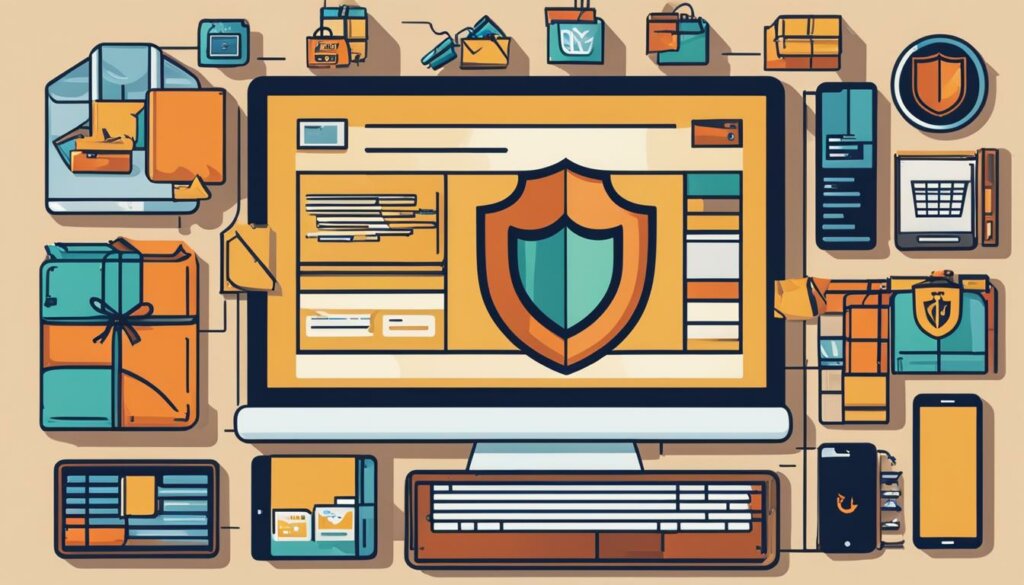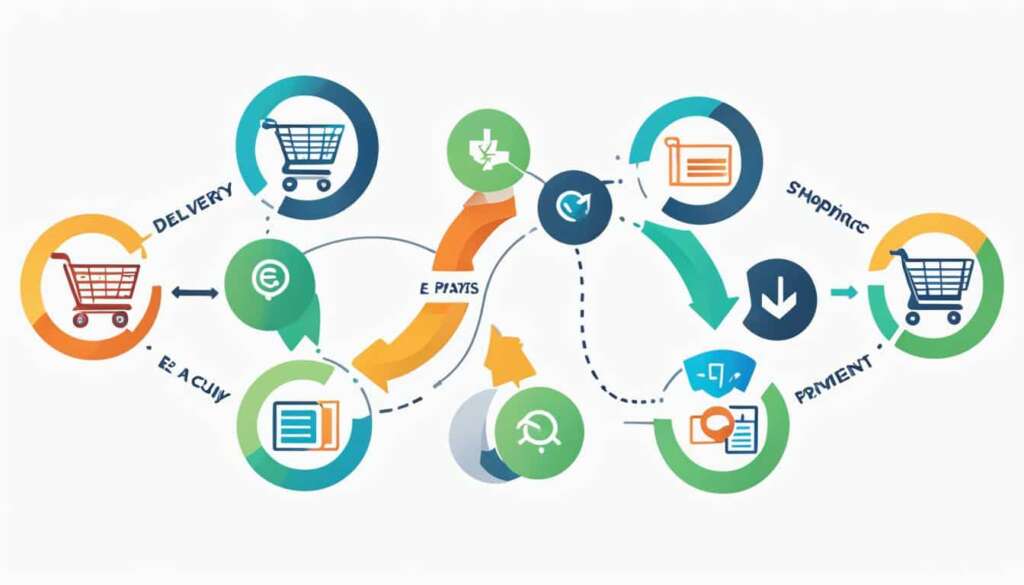Table of Contents
Running an online business comes with its own set of risks, and having the right insurance coverage is crucial. While e-commerce businesses may not face the same physical risks as brick-and-mortar stores, they still need protection against digital risks and business interruptions. This article will explore the different types of insurance coverage that e-commerce businesses should consider and provide recommendations for the best e-commerce insurance options available.
When it comes to protecting your online business, e-commerce insurance is essential. Whether you’re selling products or services online, having the right insurance coverage can provide financial security and peace of mind. From safeguarding against cyber threats to protecting your business assets, e-commerce insurance ensures that you’re prepared for any eventuality.
Without proper insurance coverage, your online business could be vulnerable to lawsuits, data breaches, and other unforeseen risks. When considering e-commerce insurance, it’s important to understand the various types of coverage available and choose the options that best suit your business needs.
Stay tuned to learn more about the importance of e-commerce business insurance, the best insurance options for e-commerce businesses, and how to get the right coverage for your online business.
The Importance of E-commerce Business Insurance
While online businesses may not have to worry about slip-and-fall accidents or physical damage to a storefront, they still face risks that can have a significant impact. E-commerce businesses should have general liability insurance to protect against customer injuries and product liability insurance to cover claims related to defective or flawed items.
Having the right insurance coverage can provide financial protection and peace of mind for e-commerce businesses.
- General liability insurance protects against customer injuries
- Product liability insurance covers claims related to defective items
Not only does insurance protect businesses from unexpected expenses, but it can also help meet the requirements of third-party platforms. For example, Amazon may require proof of business insurance for businesses to sell on their platform. By having the right insurance coverage in place, e-commerce businesses can meet these requirements and gain access to a wider customer base.
Best E-commerce Insurance Options
When it comes to protecting your online business, choosing the right insurance coverage is crucial. To ensure you’re getting the best coverage at the best price, it’s important to compare quotes from multiple insurance providers. Here are some of the top e-commerce insurance options recommended by industry experts:
NerdWallet’s Recommendations
“Next” for Amazon sellers
“Thimble” for crafty businesses
“Chubb” for a business owner’s policy
“The Hartford” for client-facing e-commerce businesses
These insurance providers offer tailored coverage options specifically designed to meet the unique needs of e-commerce businesses. By selecting the right insurance provider, you can ensure that your online business is adequately protected against potential risks and liabilities.
| Insurance Provider | Recommended for |
|---|---|
| Next | Amazon sellers |
| Thimble | Crafty businesses |
| Chubb | Business owner’s policy |
| The Hartford | Client-facing e-commerce businesses |
By considering these top recommendations and researching other insurance providers, you can find the e-commerce insurance coverage that aligns with your specific business needs. Remember that the right insurance can provide you with peace of mind and financial protection, allowing you to focus on running a successful online business.
Types of Insurance for E-commerce Businesses
E-commerce businesses face unique risks that require specific insurance coverage. To protect your online business, consider the following types of insurance:
1. General Liability Insurance
General liability insurance is essential for e-commerce businesses as it provides coverage for bodily injury and property damage claims. Whether a customer slips and falls on your premises or property is damaged during shipping, this insurance protects your business from potential lawsuits and financial losses.
2. Product Liability Insurance
If your e-commerce business sells physical products, product liability insurance is crucial. This coverage safeguards you against claims related to defective or flawed items that cause harm or injury to customers. It protects your business from potential legal expenses and compensation costs.
3. Business Property Insurance
E-commerce businesses may still have physical locations, such as warehouses or offices. Business property insurance covers your physical assets, including buildings, inventory, and equipment, against risks like theft, fire, or natural disasters.
4. Workers’ Compensation Insurance
If you have employees working for your e-commerce business, workers’ compensation insurance is a legal requirement in most regions. This coverage provides medical and wage replacement benefits to employees who are injured or become ill due to their work. It protects your business from potential lawsuits and provides financial support to affected employees.
5. Professional Liability Insurance
Professional liability insurance, also known as errors and omissions insurance (E&O), is important for e-commerce businesses that offer consulting or professional services. It covers claims arising from errors, negligence, or inadequate advice provided by your business, ensuring you’re protected from lawsuits and potential financial damages.
6. Cybersecurity Insurance
In the digital age, cyber threats are a significant concern for e-commerce businesses. Cybersecurity insurance provides coverage for financial losses and expenses associated with cyber-attacks, data breaches, or other cyber incidents. It helps you recover from cyber-related damages and protects your business and customers’ sensitive information.
7. Business Interruption Insurance
Business interruption insurance compensates for lost income and operating expenses if your e-commerce business faces disruptions. Whether it’s due to a natural disaster, equipment breakdown, or other covered events, this coverage ensures your business can bounce back and continue operating.
8. Inland Marine Insurance
Inland marine insurance covers goods and equipment that are in transit or temporarily stored at locations other than your primary premises. If your e-commerce business relies on shipping or transportation to deliver products to customers, this insurance protects your assets while they’re on the move.
Bundling these different insurance coverages through a business owner’s policy (BOP) can be a cost-effective option, especially for smaller e-commerce retailers. A BOP combines property, liability, and business interruption coverage into a single policy, providing comprehensive protection tailored to your business needs.

The Cost of E-commerce Insurance
When it comes to e-commerce insurance, the cost can vary depending on several factors. These include the number of policies needed, extent of coverage, business location, products or services offered, number of employees, business assets, and previous claims history. Higher-risk businesses or those requiring extensive coverage will typically have higher insurance costs.
To obtain an accurate cost estimate for your e-commerce insurance, it’s recommended to obtain multiple quotes from different insurance providers. This allows you to compare coverage options and pricing to find the best fit for your business needs and budget.
Keep in mind that while cost is an important consideration, it’s equally important to ensure that the insurance coverage you choose adequately protects your business against potential risks and liabilities. Balancing cost and coverage is key to finding the right e-commerce insurance solution.
Factors Affecting E-commerce Insurance Cost
Several factors can influence the cost of e-commerce insurance. Here are some key factors to consider:
- Extent of Coverage: The more comprehensive the insurance coverage, the higher the cost.
- Business Location: The region where your business operates can impact insurance premiums.
- Products or Services Offered: Businesses that sell high-risk products or offer specialized services may face higher insurance costs.
- Number of Employees: The size of your workforce can affect insurance premiums.
- Business Assets: The value of your business assets, such as inventory, equipment, and intellectual property, can impact insurance costs.
- Previous Claims History: If your business has a history of claims, it can result in higher premiums.
Understanding these factors can help you assess the potential cost of e-commerce insurance for your business.
Comparing E-commerce Insurance Quotes
“By obtaining multiple quotes from different insurance providers, you can compare coverage options and pricing to find the best fit for your business needs and budget.”
Comparing e-commerce insurance quotes is essential to ensure you’re getting the most value for your money. By evaluating different quotes, you can assess the coverage offered, deductibles, limits, and any additional features or benefits included.
When comparing quotes, consider the specific coverage requirements for your e-commerce business and choose a policy that addresses your unique risks. While cost is important, it shouldn’t be the sole determining factor. Opt for an insurance provider with a strong reputation and a history of providing excellent customer service and claims support.
Here’s a sample table displaying the comparison of e-commerce insurance quotes:
| Insurance Provider | Coverage | Premium | Customer Reviews |
|---|---|---|---|
| Provider 1 | General Liability, Product Liability, Cybersecurity | £XXXX.XX per year | ★★★★☆ |
| Provider 2 | General Liability, Business Interruption | £XXXX.XX per year | ★★★★★ |
| Provider 3 | General Liability, Professional Liability, Workers’ Compensation | £XXXX.XX per year | ★★★☆☆ |
Comparing quotes allows you to make an informed decision and select the e-commerce insurance policy that provides the best coverage and value for your business.
Remember, e-commerce insurance is an investment in protecting your business from potential risks and liabilities, and it’s crucial to strike the right balance between cost and coverage.
How to Get E-commerce Business Insurance
To successfully obtain e-commerce business insurance, it is essential to follow a series of steps. By carefully navigating through this process, you can ensure comprehensive coverage for your online business.
Evaluate the Risks Your Business Faces
Begin by conducting a thorough evaluation of the specific risks your e-commerce business may encounter. Consider potential accidents, hazards, disasters, or lawsuits that could impact your operations. By identifying these risks, you can determine the necessary insurance coverage to protect your business.
Select the Appropriate Insurance Policies
Based on the risks identified, it is crucial to choose the types of insurance policies that best suit your needs. Common coverage options for e-commerce businesses include general liability insurance, product liability insurance, business property insurance, workers’ compensation insurance, professional liability insurance, cybersecurity insurance, business interruption insurance, and inland marine insurance. Each policy serves a unique purpose, addressing different aspects of your business’s potential risks.
Decide How to Shop for Insurance
Once you have identified the necessary insurance policies, you need to determine how you will shop for insurance. There are several options available, including working with a broker, using an online marketplace, or directly contacting insurance providers. Each approach has its advantages and can help you find the best coverage options and prices for your e-commerce business.
Gather Information and Request Quotes
To obtain accurate insurance quotes, you will need to gather essential information about your business. This may include details about your operations, revenue, number of employees, locations, and any previous claims history. With this information at hand, you can confidently request quotes from different insurance providers. By comparing the coverage and pricing options, you can select the insurance policy that best aligns with your business’s needs and budget.

Follow these steps to properly secure e-commerce business insurance and ensure your online enterprise is protected from potential risks and liabilities.
Conclusion
Protecting your e-commerce business with the right insurance coverage is crucial for safeguarding against risks and ensuring long-term success. With the ever-evolving landscape of online businesses, it’s essential to understand the types of insurance available and compare quotes from reputable providers.
By taking the time to assess your specific needs and risks, you can find the best coverage options that align with your e-commerce business. Investing in e-commerce insurance not only provides financial protection but also offers peace of mind, allowing you to focus on your business’s growth and serving your customers effectively.
Remember, the cost of e-commerce insurance can vary depending on several factors, such as the extent of coverage, business location, and previous claims history. To make an informed decision, obtain multiple quotes from different providers and select the option that offers the best value for your business.
Don’t leave the success and security of your e-commerce business to chance. Take proactive measures today by finding the right insurance coverage, so you can confidently navigate the digital landscape and protect your business against potential risks.
FAQ
Why is e-commerce insurance important for online businesses?
E-commerce insurance provides protection against digital risks and business interruptions that online businesses may face. It also helps with customer injuries and claims related to defective items.
What types of insurance do e-commerce businesses need?
E-commerce businesses should have general liability insurance and product liability insurance. They may also benefit from business property insurance, workers’ compensation insurance, professional liability insurance, cybersecurity insurance, business interruption insurance, and inland marine insurance.
How can e-commerce businesses find the best insurance coverage?
It’s important to compare quotes from multiple insurance providers to ensure the best coverage at the best price. NerdWallet recommends Next, Thimble, Chubb, and The Hartford for tailored e-commerce insurance options.
How much does e-commerce insurance cost?
The cost of e-commerce insurance varies based on factors such as the extent of coverage, business location, products or services offered, number of employees, business assets, and previous claims history. Higher-risk businesses or those requiring extensive coverage will typically have higher insurance costs.
How can e-commerce businesses obtain insurance?
To obtain e-commerce insurance, businesses should evaluate their specific risks, determine the types of insurance policies needed, choose how to shop for insurance, and gather necessary information about their business to request insurance quotes.













